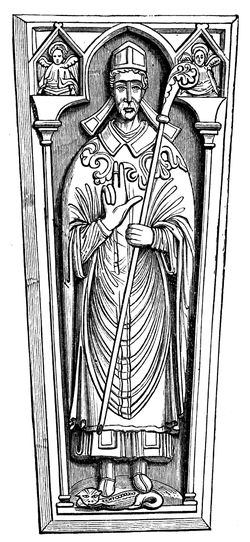Richard Marsh (bishop) facts for kids
Quick facts for kids Richard Marsh |
|
|---|---|
| Bishop of Durham | |

Bishop Marshall of Exeter, died 1206; from his tomb at Exeter, showing a bishop vested for mass.
|
|
| Elected | c. 27 June 1217 |
| Predecessor | Morgan |
| Successor | William Scot |
| Other posts | Archdeacon of Northumberland |
| Orders | |
| Consecration | probably 2 July 1217 by Walter de Gray |
| Personal details | |
| Died | 1 May 1226 Peterborough Abbey |
| Denomination | Catholic |
Richard Marsh (who died on May 1, 1226), also known as Richard de Marisco, was an important person in England's history. He held two big jobs: he was the Lord Chancellor of England and later the Bishop of Durham.
Contents
Early Life and Education
Richard Marsh went to a university, which means he was well-educated for his time. People called him magister, which is like saying "master" or "teacher." We don't know which university he attended, or much about his family when he was growing up.
Before he became famous, Richard worked as a clerk for the king. He was also a canon at Exeter Cathedral. A canon is a type of priest who works with a cathedral.
Becoming an Archdeacon
By November 1, 1211, Richard became the Archdeacon of Northumberland. An archdeacon is a senior church official who helps the bishop manage a part of the diocese. He also held the title of Archdeacon of Richmond. During this time, he helped manage the country's money.
Working for the King
In 1212, Richard Marsh took on more important roles for the king. He became the Sheriff of Somerset and Dorset. A sheriff was a powerful official who kept law and order in a county.
Challenges and Negotiations
The Archbishop of Canterbury, Stephen Langton, was upset with Richard. He threatened to kick Richard out of the church because Richard had collected money from churches during a difficult time for King John.
In 1213, Richard traveled to Rome. He went to talk with the Pope about his own situation and also for King John. He was good at negotiating and managed to get much better terms from the Pope than expected.
Becoming Lord Chancellor
Richard Marsh became the Lord Chancellor of England on October 29, 1214. He held this important job until he died in 1226. The Lord Chancellor was one of the most powerful officials in the kingdom, often acting as the king's chief minister.
After he became a bishop in 1217, his role as Chancellor became more of an honorary title. He didn't attend the king's court all the time. Most of the daily work of the Chancellor was done by Ralph Neville, who was in charge of the king's official seal.
Life as a Bishop
Richard Marsh was chosen to be the Bishop of Durham around June 27, 1217. He was likely made a bishop on July 2, 1217. His election was supported by a special representative of the Pope, Guala Bicchieri.
Consecration and Conflicts
Archbishop Walter de Gray of York officially made him a bishop in a ceremony held in Gloucester. As Bishop of Durham, Richard was in charge of a large and important church area.
In 1224, a man named Fawkes de Breauté kidnapped a royal judge. He held the judge at Bedford Castle. To help pay for the army to get the judge back and take the castle, the clergy (church leaders) voted to contribute money. Even though Richard was part of a different church region, he willingly gave money to help.
Richard also had ongoing disagreements with the monks of his cathedral. They often argued about money and the rights of the monks.
Death and What He Left Behind
Richard Marsh died suddenly on May 1, 1226. He was at Peterborough Abbey when it happened. He had been on his way to London for a court hearing about his lawsuit with the monks.
His nephew, Adam Marsh, inherited his property. Richard also left his large collection of books to his nephew.
 | Ernest Everett Just |
 | Mary Jackson |
 | Emmett Chappelle |
 | Marie Maynard Daly |

